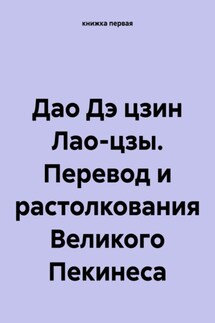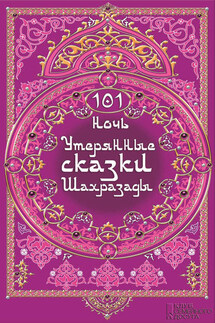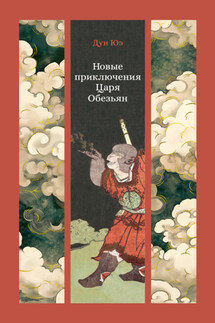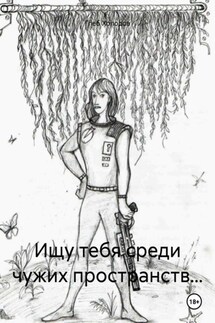Дао Дэ цзин Лао-цзы. Перевод и растолкования Великого Пекинеса - страница 17
Weapons are the instruments of misfortune.
They are used when there is no choice,
And it is best to act calmly and with restraint.
Having won, [the winner] is not glorified.
Praising [the winner means] rejoicing in the killing of people.
The one who rejoices in the killing of people,
Will not succeed in achieving [his] goals under Heaven.
That is why in happy affairs the «left» is revered.
In mourning, [we] honor the «right».
That's why the junior officers stand on the left.
The commander-in-chief stands on the right.
In a word, they stand [just as at] a funeral ceremony.
[When] crowds of people are killed,
grief and mournful weeping [are only appropriate].
[We celebrate] the victory in the war with a funeral ceremony.
32.
(1) Вечное Дао не обозначить.
(道 дао 常 чан 無 у 名 мин)
(2) Нерасколотое, оно хоть и ничтожно,
(名 пу 雖 суй 小 сяо)
(3) Но нет никого под Небесами, кто мог бы повелевать им.
(天 тянь 下 ся 莫 мо 能 нэн 臣 чэнь 也 е)
(4) Были бы знать и цари способны [Дао] хранить,
(侯 хоу 王 ван 若 жо 能 нэн 守 шоу 之 чжи)
(5) Десять тысяч вещей сами бы им подчинились.
(萬 вань 物 у 將 цзян 自 цзы 賓 бинь)
(6) Земля и Небо сошлись бы вместе и ниспослали бы сладкие росы.
(天 тянь 地 ди 相 сян 合 хэ 以 и 降 цзян 甘 гань 露 лу)
(7) Люди без [всякого] им приказания сами [пришли бы] к согласию.
(民 минь 莫 мо 之 чжи 令 мин 而 эр 自 цзы 均 цзюнь 焉 янь)
(8) Имена есть, [когда] начинают раскалывать [Дао].
(始 ши 制 чжи 有 ю 名 мин)
(9) Как только есть имя, знай, именно [здесь и надо] остановиться.
(名мин 亦 и 既 цзи 有 ю 夫 фу 亦 и 將 цзян 知 чжи 止чжи)
(10) Знать, [где] остановиться –
[так] сможешь беду не [встретить].
(知 чжи 止 чжи 可 кэ 以 и 不 бу 殆 дай)
(11) К примеру, для Дао [все, что] под Небесами,
(譬 пи 道 дао 之 чжи 在 цзай 天 тянь下 ся)
(12) Будто бы ручейки в долине для [большой] реки [или] моря.
(猶 ю 川 чуань 谷 гу 之 чжи 與 юй 江 цзян 海 хай)
Eternal Dao is nameless.
Unsplit, though it is insignificant,
But there is no one under Heaven who can command it.
Were princes and kings able to keep it,
Ten thousand things would obey them on their own.
Earth and Heaven would come together and send down sweet dew.
People would have come to an agreement themselves
without [any] orders.
There are names [when people] begin to split [Dao].
As soon as there is a name, know [it is time] to stop.
To know [where] to stop – [so] you can not [meet] any trouble.
For example, for Dao, [everything] under Heaven
Is like streams in a valley for a [large] river [or] sea.
33.
(1) Кто знает других, умен.
(知 чжи 人 жэнь 者 чжэ 知 чжи 也 е)
(2) Кто знает себя, видит Ясно.
(自 цзы 知 чжи 者 чжэ 明 мин 也 е)
(3) Кто побеждает других, обладает силой.
(勝 шэн 人 жэнь 者 чжэ 有 ю 力 ли 也 е)
(4) Кто побеждает себя, могуч.
(自 цзы 勝 шэн 者 чжэ 強 цян 也 е)
(5) Кто знает достаток, богат.
(知 чжи 足 цзу 者 чжэ 富 фу 也 е)
(6) Кто применяет силу, устремлен к цели,
(強 цян 行 син 者 чжэ 有 ю 志 чжи 也 е)
(7) [Но] долговечно [лишь] то, что на своем месте.
(不 бу 失 ши 亓 ци 所 со 者 чжэ 久 цзю 也 е)
(8) Умер, но не забыт – [вот это] долгая жизнь.
(死 сы 而 эр 不 бу 亡 ван 者 чжэ 壽 шоу 也 е)
Who knows others is smart.
Who knows himself sees clearly.
The one who conquers others has strength.
He who conquers himself is mighty.
Who knows contentment is rich.
Whoever uses force is directed towards the goal,
[But only] what is in its place [will] endure.
To die, but not be forgotten – [this is] a long life.
34.
(1) Великое Дао разливается всюду!
Оно может [быть] слева и справа.






